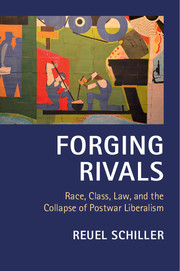Book contents
- Frontmatter
- Dedication
- Epigraph
- Contents
- Acknowledgments
- Introduction: Legal History and the Death of Postwar Liberalism
- 1 Forging Postwar Liberalism
- 2 Ed Rainbow's Problem
- 3 The Phony Commission
- 4 A Tale of Two Propositions
- 5 1966: A Terrible Year for George Johns
- 6 “The Day of the Minstrel Show Is Over”
- 7 Forging Rivals, Shattering Liberalism
- List of Abbreviations for Archival Sources
- Notes
- Index
1 - Forging Postwar Liberalism
Published online by Cambridge University Press: 05 April 2015
- Frontmatter
- Dedication
- Epigraph
- Contents
- Acknowledgments
- Introduction: Legal History and the Death of Postwar Liberalism
- 1 Forging Postwar Liberalism
- 2 Ed Rainbow's Problem
- 3 The Phony Commission
- 4 A Tale of Two Propositions
- 5 1966: A Terrible Year for George Johns
- 6 “The Day of the Minstrel Show Is Over”
- 7 Forging Rivals, Shattering Liberalism
- List of Abbreviations for Archival Sources
- Notes
- Index
Summary
In the summer of 1949, Arthur Schlesinger Jr., then a thirty-two-year-old history professor at Harvard, took a trip from Cambridge to Washington, DC. It was a homecoming of sorts. After spending World War II working for the Office of Strategic Services in London, Schlesinger had returned to the United States in 1945, and had set up shop as a freelance journalist in DC. Although a job offer from Harvard's history department came within the next year and was too tempting to turn down, Schlesinger had loved his time in the District and relished the role of public intellectual too much to retreat into the ivory tower entirely. Consequently, when the opportunity arose to write an article for Life magazine on the relationship between Franklin Roosevelt's New Deal and Harry Truman's Fair Deal, he happily rode the rails to Washington to interview some of the principals in the Truman administration.
Schlesinger's article, “The Fair Dealers and the New Dealers,” never saw the light of day. Its glowing assessment of Truman's agenda – a national health plan, income guarantees for farmers, civil rights legislation, government spending to promote full employment – was too liberal for the dower and reactionary cultural commissars of the Luce publishing empire. “He's such a rampant ‘liberal’ that it colors and contradicts all his conclusions,” wrote John Shaw Billings, the Luce publications' editorial director, as he ordered Life editor Joseph Thorndike to kill the piece.
Schlesinger's thesis was simple. Truman's Fair Deal was a “normalized, rationalized” version of Roosevelt's New Deal. In terms of public policy, Schlesinger believed that the Fair Deal was the more radical of the two. It expanded the welfare state in ways that Roosevelt and his New Dealers could not have even imagined: “a society where government will guarantee levels of income, employment, education, housing, and medical aid below which no one will be allowed to fall.” Schlesinger also claimed that the Fair Deal was committed to government economic planning to a degree that Roosevelt would have “never ventured.”
- Type
- Chapter
- Information
- Forging RivalsRace, Class, Law, and the Collapse of Postwar Liberalism, pp. 13 - 47Publisher: Cambridge University PressPrint publication year: 2015

